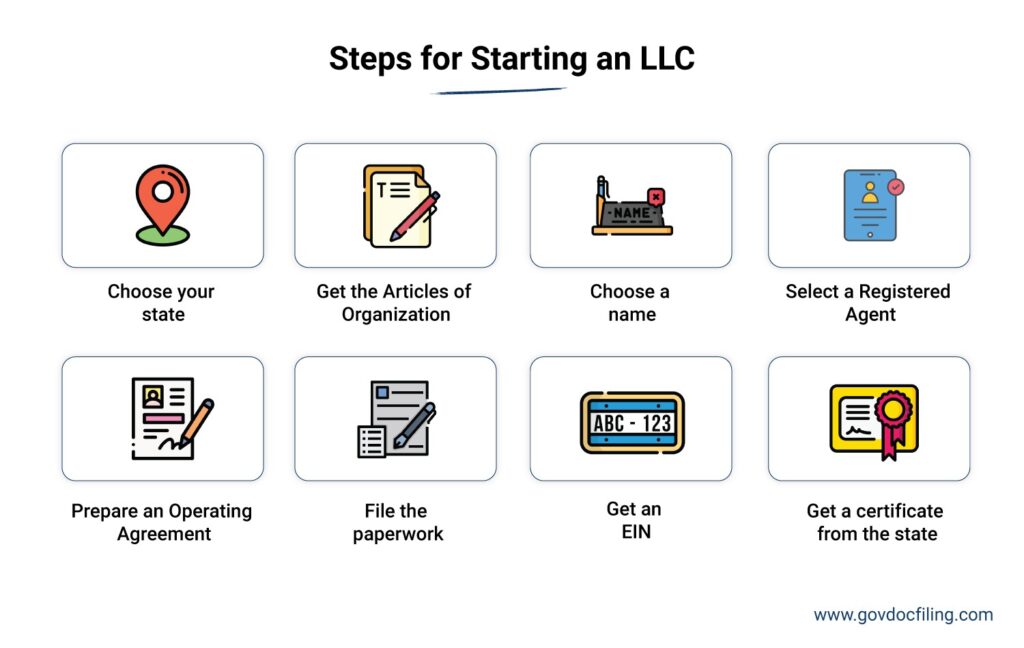Steps to Form an LLC Company in 2024 – Asim Blogs

1. Choose Your LLC’s Name
The first step in forming an LLC is selecting a unique and legally compliant name. The name should reflect your brand and be easy to remember.
- Uniqueness: Ensure the name is distinguishable from existing businesses registered in your state.
- Compliance: Include “Limited Liability Company” or an abbreviation like “LLC” or “L.L.C.” as part of your business name.
- Trademarks: Check for any trademarks that might conflict with your chosen name using the U.S. Patent and Trademark Office’s database.
- Domain Name: Verify the availability of your business name as a domain name for your website.
2. Appoint a Registered Agent
A registered agent is a person or entity designated to receive legal documents on behalf of the LLC. This could include service of process, government correspondence, and compliance documents.
- Requirements: The registered agent must have a physical address in the state where the LLC is formed and be available during business hours.
- Options: You can act as your own registered agent, appoint a trusted individual, or hire a professional registered agent service.
3. File Articles of Organization
The Articles of Organization (also known as Certificate of Formation or Certificate of Organization in some states) is the official document filed with the state to legally establish your LLC.
- Information Included: The document typically includes the LLC’s name, principal address, purpose, duration, and the name and address of the registered agent.
- Filing Fee: There is a filing fee, which varies by state, ranging from $50 to $500. Check your state’s specific requirements and fees.
- Submission: File the Articles of Organization with the appropriate state agency, usually the Secretary of State’s office. Many states offer online filing options.
4. Create an Operating Agreement
An Operating Agreement is a legal document outlining the ownership and operating procedures of the LLC. While not required in all states, it is highly recommended to avoid future conflicts.
- Content: The agreement typically includes details about member roles and responsibilities, voting rights, profit and loss distribution, management structure, and procedures for member changes.
- Customization: Tailor the Operating Agreement to fit your LLC’s specific needs and ensure all members agree on the terms.
- Legal Counsel: Consider consulting with an attorney to draft or review your Operating Agreement to ensure it complies with state laws and adequately protects members’ interests.
5. Obtain an EIN (Employer Identification Number)
An EIN, or Employer Identification Number, is issued by the IRS and is used for tax purposes. It’s essentially the Social Security number for your LLC.
- Application: Apply for an EIN online through the IRS website. The application is free and can be completed in minutes.
- Uses: You’ll need an EIN to open a business bank account, hire employees, file taxes, and apply for business licenses and permits.
6. Register for State Taxes
Depending on your state and the nature of your business, you may need to register for various state taxes.
- Sales Tax: If your LLC sells goods or services, you may need to collect sales tax and remit it to the state.
- Employment Taxes: If you have employees, you’ll need to register for state employment taxes, including unemployment insurance and workers’ compensation.
- Income Tax: Some states require LLCs to pay state income tax or franchise tax.
Check with your state’s tax agency to determine which taxes apply to your LLC and register accordingly.
7. Obtain Business Licenses and Permits
Depending on your industry and location, your LLC may need specific licenses and permits to operate legally.
- Local Requirements: Check with your city or county government for local licensing requirements.
- State Requirements: Consult your state’s business licensing agency for state-specific licenses and permits.
- Industry Requirements: Certain industries, such as healthcare, construction, and food services, have specialized licensing requirements. Research the specific requirements for your industry.
8. Open a Business Bank Account
Separating your personal and business finances is crucial for maintaining limited liability protection and ensuring accurate bookkeeping.
- Documentation: To open a business bank account, you’ll typically need your EIN, Articles of Organization, and Operating Agreement.
- Bank Selection: Choose a bank that offers the services and features that best meet your LLC’s needs, such as online banking, low fees, and robust customer service.
9. Maintain Compliance with Ongoing Requirements
After forming your LLC, there are ongoing compliance requirements to keep your business in good standing with the state.
- Annual Reports: Many states require LLCs to file annual reports and pay a fee to maintain their status.
- Taxes: File federal, state, and local taxes as required. This includes income tax, sales tax, and employment tax filings.
- Renew Licenses and Permits: Ensure all business licenses and permits are kept current and renewed as necessary.
- Maintain Records: Keep accurate and up-to-date records of your LLC’s financial transactions, meetings, and compliance documents.
Special Considerations for Forming an LLC in 2024
Regulatory Changes
Stay informed about any changes in state or federal regulations that may affect LLC formation and operation. This includes updates to tax laws, employment regulations, and industry-specific rules.
Technological Advancements
Leverage technology to streamline the LLC formation process and ongoing operations. This includes using online filing systems, digital bookkeeping tools, and communication platforms to enhance efficiency.
Sustainable Practices
Consider incorporating sustainable business practices into your LLC’s operations. This can enhance your brand’s reputation, attract eco-conscious customers, and contribute to long-term success.
Common Mistakes to Avoid
Inadequate Planning
Failing to plan adequately before forming your LLC can lead to problems down the road. Take the time to research, create a business plan, and consult with professionals if needed.
Skipping the Operating Agreement
Even if your state doesn’t require an Operating Agreement, skipping this step can lead to disputes among members. An Operating Agreement clarifies roles, responsibilities, and procedures, helping to prevent conflicts.
Mixing Personal and Business Finances
Keep your personal and business finances separate to maintain liability protection and ensure accurate accounting. This includes using a dedicated business bank account and credit card for LLC transactions.
Neglecting Compliance Requirements
Failing to comply with state and federal requirements can result in penalties, fines, or even the dissolution of your LLC. Stay on top of filing deadlines, tax obligations, and license renewals to keep your business in good standing.
Benefits of Professional Assistance
Legal Counsel
Hiring an attorney can ensure that your LLC is formed correctly and complies with all legal requirements. Legal counsel can also help with drafting your Operating Agreement and advising on regulatory matters.
Accounting Services
An accountant can assist with tax planning, bookkeeping, and financial management, helping your LLC stay financially healthy and compliant with tax laws.
Registered Agent Services
Using a professional registered agent service ensures that your LLC meets state requirements and that important legal documents are handled promptly and securely.
Conclusion
Forming an LLC is a significant step in establishing and protecting your business. By following the outlined steps and considering the unique aspects of forming an LLC in 2024, you can create a solid foundation for your business’s success. Whether you choose to handle the process yourself or seek professional assistance, taking the time to do it right will pay off in the long run.
With careful planning, compliance with legal requirements, and a commitment to ongoing management, your LLC can thrive, providing the benefits of limited liability protection, tax flexibility, and operational efficiency. As you embark on this journey, remember that forming an LLC is not just about meeting legal requirements—it’s about building a resilient and sustainable business that can adapt and grow in the years to come.


